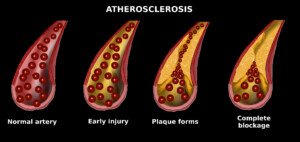When a superstar influencer gets an Instagram comment of “Obesity isn’t healthy,” defensive followers post back, “Thin people die of heart attacks all the time.”
This reasoning is extremely flawed.
There are morbidly obese body-positive influencers who often receive comments about how they’re going to have an early death, how their kids will be left without a mother while still young, how their children won’t have a mother later in life, etc.
Vigilante supporters of these morbidly obese influencers are quick to pounce back, typically pointing out that they have skinny friends who take heart medications, who get winded easily, and thin relatives who’ve had heart attacks or crippling strokes.
Their mantra is, “Thin people can be unhealthy.”
Indeed, they certainly CAN. However … and this is a huge however … a normal BMI (body mass index) or a “normal” or slender body weight is NEVER a risk factor for any medical condition!
To date, weighing 125 pounds on a 5’6 frame – in and of itself – has not been shown to increase the risk of cardiovascular events or early death.

Shutterstock/Vikacita
If such an individual has a bad heart, then it’s because he or she has OTHER risk factors or causative agents for heart disease, such as a smoking habit, cocaine use, high blood pressure, a junk food diet or never doing any exercise.
“Obesity is an independent risk factor for heart disease,” says Nieca Goldberg, MD, medical director of NYU Women’s Heart Program and radio show host of “Beyond the Heart” on Doctor Radio SiriusXM.
Dr. Goldberg adds, “It also increases risk for high blood pressure, type 2 diabetes and elevated triglycerides and low levels of good cholesterol HDL.”
High Blood Pressure
This condition is so prevalent in the U.S. that it doesn’t surprise cardiologists and bariatric physicians that many thin people have it.
Obesity isn’t the only cause.
A thin person with uncontrolled high blood pressure is at high risk for a stroke — because of the hypertension, not the body weight.
This is a horrible defense for “A person who’s morbidly obese can still be healthy.”

Shutterstock/Hannamariah
Heart Disease
Dr. Goldberg continues, “Weight is not the only risk factor for heart disease.
“You can be of normal weight and still have a heart attack.
“High cholesterol, cigarette smoking, diabetes, family history and sedentary lifestyle are also risks for heart disease.”
The observation that skinny people can get heart disease or stroke doesn’t show cause and effect.
Rather, their trim frame is just incidental to any cardiovascular-related medical condition. This assumes that the thinness isn’t of anorexia nervosa caliber.
“No matter what your weight, you can be at risk for heart disease,” says Dr. Goldberg.
Diabetes
Do these worshippers of very heavy body-positive influencers know what TYPE of diabetes their skinny friend has?
Type 1 diabetes seemingly strikes from nowhere, affecting even babies. This explains why some diabetics are of normal weight or thin.
However, only 10 percent of all diabetics have the type 1 variant.
Eighty percent of type 2 diabetics are overweight.
Example of How a Thin Person Can Get Clogged Arteries

Shutterstock/Cessna152
• Alan is 45, 5’9 and 140 pounds. He never exercises.
• His diet is mostly processed foods.
• He smokes a pipe.
Alan has a weak heart, high blood pressure and must take medications for these.
So that’s just one example of how a so-called skinny person could develop cardiovascular problems.
In a Nutshell
• Thin people can be unhealthy including heart disease.
• There are MANY risk factors for heart disease.
• One is obesity.
• Having a slender frame is not a risk factor for artery blockages, high cholesterol, hypertension, type 2 diabetes, stroke, heart attack, heart failure or cancer.
• Lack of exercise will make a thin person get easily winded. Imagine how much more “out of shape” they’d be if they packed on a hundred pounds of fat.
Fat Is Never Healthy

Shutterstock/Creativa Images
Obesity is never a healthy way for one’s body to exist, even if a snapshot in time reveals normal blood work and blood pressure.
Being of normal weight or of slim build does NOT cost America $190 billion in annual healthcare costs due to thin-related illness. But this is how much obesity costs the U.S. for obesity-related illness (Harvard School of Public Health).
The negative impact that obesity, especially morbid, has on any body becomes increasingly relevant as that individual approaches middle age.
Youth is an amazing protector against sickness.
 Dr. Goldberg is senior advisor, Women’s Health Strategy, NYU Langone Health; founder and former medical director, Joan H. Tisch Center for Women’s Health; and clinical associate professor, NYU Grossman School of Medicine.
Dr. Goldberg is senior advisor, Women’s Health Strategy, NYU Langone Health; founder and former medical director, Joan H. Tisch Center for Women’s Health; and clinical associate professor, NYU Grossman School of Medicine.
 Lorra Garrick has been covering medical, fitness and cybersecurity topics for many years, having written thousands of articles for print magazines and websites, including as a ghostwriter. She’s also a former ACE-certified personal trainer for Bally Total Fitness.
Lorra Garrick has been covering medical, fitness and cybersecurity topics for many years, having written thousands of articles for print magazines and websites, including as a ghostwriter. She’s also a former ACE-certified personal trainer for Bally Total Fitness.
.










































